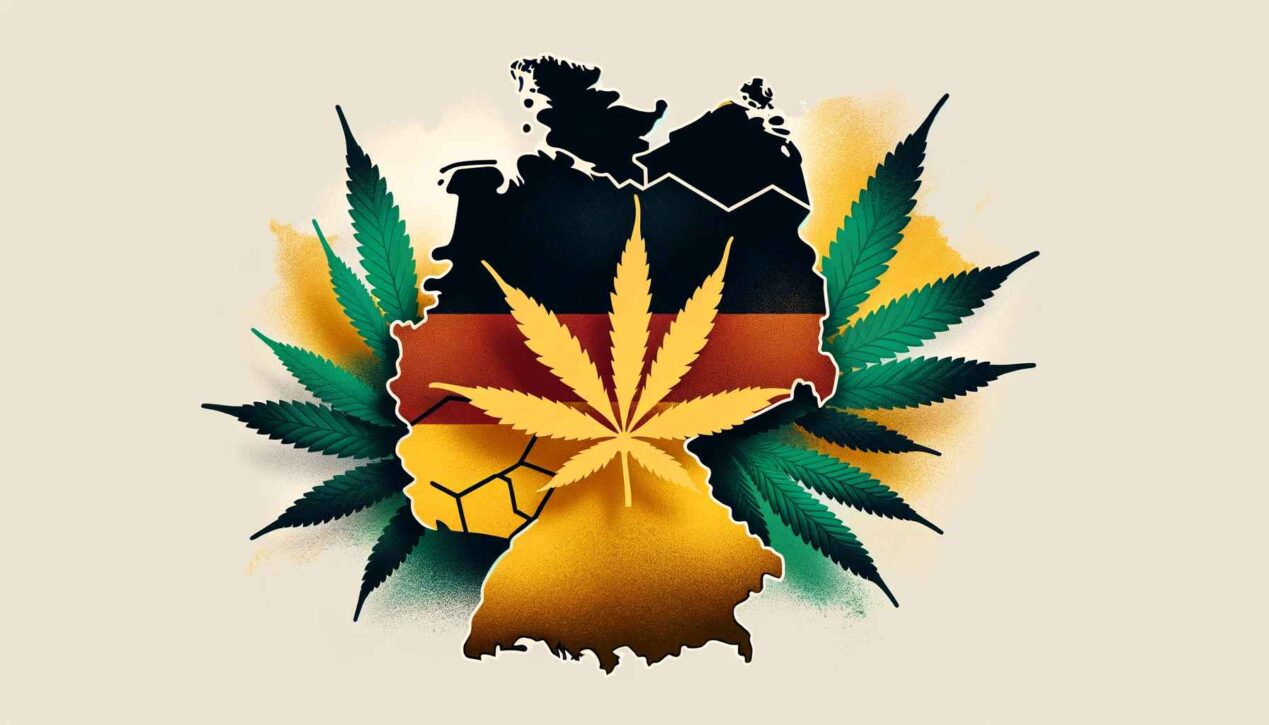Germany has marked a significant shift in its drug policy landscape with the recent enactment of landmark legislation altering the legal status of cannabis. As of April 1, 2024, Germany joins the ranks of European countries adopting more liberal cannabis laws. This new legislation, a result of prolonged political discussions and debates, allows adults to legally possess and cultivate limited amounts of cannabis for personal use.
The decision reflects a broader trend within the European Union towards reevaluating and, in some cases, relaxing the laws governing cannabis use. Germany’s move is particularly notable given its position as one of the largest economies in Europe. By allowing the cultivation and possession of cannabis, Germany sets a precedent that could influence drug policy reforms in neighboring countries.
As Germany embarks on this new chapter in drug policy, the world watches closely. The implementation of this law will not only affect cannabis users but also has implications for law enforcement, the healthcare system, and the broader societal understanding of drug use and addiction.
Historical Context

The evolution of cannabis legislation in Germany reflects a journey from stringent prohibition to cautious liberalization, mirroring broader shifts in societal attitudes and political debates surrounding drug policy.
Early Regulations and Prohibition
Initially, cannabis in Germany, similar to many other countries, was not specifically regulated. This changed dramatically in the early 20th century with the international movement towards drug regulation. Germany’s narcotics laws progressively included cannabis among the substances subject to strict control and prohibition. For decades, possession, sale, and cultivation of cannabis were illegal, with enforcement varying in strictness over time.
The Shift Towards Decriminalization
By the late 20th and early 21st centuries, a global reevaluation of cannabis policy emerged, influenced by changing social attitudes, criticisms of the War on Drugs, and increasing evidence of cannabis’ medical benefits. Germany’s stance began to shift during this period, albeit more cautiously than in some other countries.
Medical cannabis marked the beginning of this shift. In 1998, dronabinol (a synthetic form of THC) was rescheduled in Germany to allow for medical use under prescription, a significant move that paved the way for further legislative changes. By 2017, the German government had passed a law allowing seriously ill patients access to natural cannabis for therapeutic purposes, recognizing the medical benefits of the drug. This legislation was a milestone, establishing a regulated system for the prescription, sale, and insurance coverage of medical cannabis.
Recent Developments and Legalization Efforts
The debate over recreational cannabis use has been ongoing, with political parties and public opinion deeply divided. Proponents of legalization have argued for the benefits of regulated access, including harm reduction, control over the quality and safety of cannabis products, and the alleviation of the burden on the legal system. Opponents have raised concerns about potential increases in consumption, especially among young people, and the possible health risks associated with cannabis use.
The Green Party, the Free Democratic Party, and The Left have been vocal supporters of more liberal cannabis policies, advocating for regulated legalization. These discussions have been part of broader coalition negotiations and have significantly influenced the political landscape regarding drug policy.
The Landmark Legislation of 2024
The culmination of these debates and legislative efforts is the recent landmark legislation that came into effect on April 1, 2024. This law represents a significant shift in Germany’s approach to cannabis, moving from outright prohibition to a regulated system allowing adult possession and cultivation of limited amounts of cannabis for personal use. The legislation reflects a nuanced stance, aiming to balance the benefits of regulation with concerns about public health and safety.
This history of cannabis legislation in Germany illustrates the country’s careful navigation of the complex issues surrounding drug policy. It underscores a broader trend towards reevaluation and reform of cannabis laws, driven by changing societal values, political debates, and emerging evidence on the impacts of cannabis use.
The Legislative Journey

The legislative process that led to the legalization of cannabis in Germany was complex and fraught with debates, reflecting the country’s divided opinion on this issue. The journey to legalization involved detailed discussions within the governing coalition, notable opposition from various quarters, and a meticulous consideration of the law’s provisions.
Governing Coalition and Legislative Process
The governing coalition, consisting of the Social Democratic Party (SPD), the Greens, and the Free Democratic Party (FDP), played a pivotal role in pushing forward the cannabis legalization agenda. These parties had included cannabis legalization in their coalition agreement, signaling a clear intent to reform Germany’s drug laws. Despite this agreement, the process was not straightforward, with detailed negotiations required to settle on the specifics of the law and address concerns from various stakeholders.
The legislative process was characterized by extensive debates on the floor of the Bundestag (Germany’s lower house of parliament) and the Bundesrat (the upper house), reflecting the broader societal debate on this issue. Proponents argued that legalization would allow for regulated access to cannabis, reduce the black market, and provide adults with the freedom to make their own choices regarding cannabis consumption. Critics, including some from the opposition Christian Democratic Union (CDU), raised concerns about the potential for increased use among young people and the possible public health implications.
Specific Provisions of the Law
The law, which came into effect on April 1, 2024, includes several key provisions designed to regulate the cultivation, possession, and use of cannabis among adults:
- Possession Limits: Adults are allowed to possess up to 25 grams of cannabis for personal use in public spaces or up to 50 grams at home (either marijuana or hashish in its pure form). This provision aims to decriminalize personal use while still imposing limits to prevent abuse.
- Home Cultivation: Individuals are permitted to cultivate up to three cannabis plants at home. This measure is intended to provide adults with the means to produce their own cannabis for personal use, reducing reliance on the black market.
- Cannabis Social Clubs: Starting July 1, 2024, cannabis social clubs will be legal. These clubs can have up to 500 members and are allowed to distribute cannabis to their members, subject to certain limits. This innovative approach aims to provide a regulated, community-based framework for cannabis cultivation and distribution.
- Age Restrictions: The law prohibits the possession and use of cannabis by individuals under the age of 18, emphasizing the government’s commitment to protecting young people from potential harms associated with cannabis use.
The legislation represents a significant shift in Germany’s approach to cannabis, moving from prohibition to a regulated system that acknowledges the realities of cannabis use while attempting to mitigate potential risks. The debate surrounding this law highlights the ongoing tensions between personal freedom, public health, and societal norms. As Germany embarks on this new path, the implementation and impact of the law will be closely watched, both within the country and internationally.
Comparison with Other EU Countries

Germany’s recent legislation on cannabis puts it at the forefront of a slowly liberalizing trend in Europe, though the stance on cannabis varies widely across the continent. With the legalization of cannabis for personal use and cultivation, Germany has adopted one of the more liberal approaches in Europe.
The Netherlands
The Netherlands has long been considered a pioneer in cannabis liberalization, with its famous “coffee shops” allowed to sell cannabis under regulated conditions. However, the Netherlands maintains a policy that is restrictive in some aspects, particularly towards tourists and non-residents, to whom sales are often prohibited. This policy aims to curb drug tourism and the social issues it can bring. While possession and purchase within specified limits are decriminalized, the production and wholesale distribution of cannabis remain illegal, creating a paradoxical situation often referred to as the “backdoor policy”.
Malta
Malta was the first European Union country to legalize the cultivation and personal use of cannabis. As of 2021, Maltese adults can carry up to 7 grams of cannabis and grow up to four plants at home for personal use. However, smoking in public places and trafficking remain illegal. Malta’s laws represent one of the most progressive stances on cannabis in Europe, focusing on decriminalizing personal use while maintaining strict controls against public consumption and commercial distribution.
Luxembourg
Following Malta, Luxembourg also took significant steps towards cannabis liberalization. It allows adults to grow up to four cannabis plants per household. The approach aims to reduce the black market’s influence by permitting personal cultivation, though, like Malta, it stops short of fully commercializing cannabis sales. This measure is part of Luxembourg’s broader drug policy reform, aiming to reduce harm and shift the focus from criminal punishment to public health.
Germany’s new laws are among the most liberal in the EU, particularly because they allow for both possession and home cultivation. Unlike the Netherlands, which has restrictions on sales to tourists and non-residents, Germany’s laws do not differentiate based on nationality, focusing instead on adult use within specified limits. The allowance for cannabis social clubs, introduces a novel model for communal cultivation and distribution within a regulated framework, a step not seen in many other jurisdictions.
Public Opinion and Debate

Social surveys and research show that society often looks at the issue of cannabis legalization in a polar way. About half believe that this should be done, and the other half are against it. This division in public opinion underscores the complexities and nuances involved in the issue, ranging from public health concerns to arguments about personal freedom and economic benefits.
Arguments in Favor of Legalization
- Regulation and Quality Control: Proponents argue that legalizing cannabis allows for regulation of the market, ensuring the quality and safety of cannabis products. Regulation can help eliminate contaminants and adulterants often found in illicit market products. This approach is seen as a way to protect consumers by providing them with safer products and accurate information about their content.
- Economic Benefits: The legalization of cannabis opens up new economic opportunities, including job creation in the cannabis industry, increased tax revenues, and reduced costs associated with law enforcement and incarceration for cannabis-related offenses. Proponents highlight the potential for a legal cannabis market to contribute significantly to the economy.
- Reduction of Black Market and Crime: Another argument in favor of legalization is the potential to reduce the black market and associated criminal activity. By providing a legal avenue for cannabis procurement, the demand for illegal sources can decrease, potentially reducing the power of organized crime groups and the violence associated with the illicit drug trade.
- Personal Freedom and Civil Liberties: Supporters also frame cannabis legalization as a matter of personal freedom and civil liberties. They argue that adults should have the right to make their own choices regarding cannabis consumption, provided it does not harm others.
Arguments Against Legalization
- Youth Access and Use: Opponents of legalization express concern about the potential for increased cannabis use among young people. They argue that legalization may send a message that cannabis is safe or acceptable to use, potentially leading to higher rates of use among teenagers and young adults, with implications for their health and development.
- Public Health Risks: Critics also point to the potential public health risks associated with cannabis use, including the risk of addiction, mental health issues like psychosis and schizophrenia, and impaired cognitive and motor functions. They argue that legalization may lead to an increase in these health issues in the population.
- Uncertain Long-Term Consequences: There is also concern about the unknown long-term consequences of legalization, both in terms of health impacts and societal effects. Critics caution that the full ramifications of creating a legal cannabis market are not yet understood and that policy should be approached with caution.
- Impact on Road Safety: Concerns about road safety are frequently cited, with opponents of legalization worried that it will lead to an increase in drugged driving incidents. The challenges of accurately measuring impairment and enforcing laws against driving under the influence of cannabis are significant concerns.
The debate in Germany reflects a broader global conversation about how to manage cannabis use in society. As Germany and other countries navigate these issues, the experiences and data gathered will likely contribute valuable insights into the benefits and challenges of cannabis legalization.
Medical and Social Implications

The new cannabis legislation in Germany has sparked a significant discussion around its medical and social implications, highlighting the balance between potential risks and benefits. These considerations touch on both public health concerns and the social fabric of communities.
Potential Benefits
- Reduced Stigma and Increased Research: Legalization may reduce the stigma associated with cannabis use, encouraging individuals to seek information and support more openly. It also opens avenues for more comprehensive research into cannabis’s medicinal properties, potentially leading to new treatments for chronic pain, epilepsy, and other conditions.
- Controlled Access and Harm Reduction: By regulating the cannabis market, the government can control the potency and quality of products available, potentially reducing the risks associated with contaminated or high-potency street cannabis. This controlled environment could lead to harm reduction, especially when compared to the unregulated black market.
Potential Risks
- Youth Consumption: A primary concern among medical professionals is the impact of legalization on young people. The developing brain is more susceptible to the potential negative effects of cannabis, including addiction and mental health issues such as psychosis and schizophrenia. Critics of the law worry that increased accessibility and normalization of cannabis could lead to higher rates of use among teenagers and young adults, potentially impacting their cognitive development and mental health.
- Public Health Implications: Beyond youth consumption, there are broader public health implications to consider. While cannabis is often touted for its therapeutic benefits, long-term use has been associated with various health risks, including respiratory problems and potential impacts on mental health. Medical professionals emphasize the need for continued public education and research to fully understand these effects and to inform users about safe consumption practices.
- Social Implications: Socially, the implications of cannabis legalization are multifaceted. While it could lead to reduced criminalization and provide a new source of tax revenue, concerns remain about social normalization of drug use and its impact on workplace safety, road safety, and overall public health. These concerns highlight the need for effective regulations and public health campaigns to mitigate potential risks.
Addressing Concerns
To address these concerns, especially regarding youth access, Germany’s legislation includes specific provisions, such as age restrictions and limits on possession and cultivation. Furthermore, public health initiatives focusing on education and prevention are crucial to mitigate risks, particularly among young people and other vulnerable populations. Ongoing research and monitoring will also be vital in assessing the law’s long-term impacts and adjusting policy as needed to ensure public health and safety.
While Germany’s new cannabis law represents a significant shift toward legalization, it also necessitates a careful approach to address the potential medical and social implications. Balancing the benefits of reduced criminalization and potential medical advances with the risks to youth and public health will be a critical challenge moving forward.
Future Prospects and Challenges

The future of cannabis legalization in Germany stands at a pivotal juncture, with the initial steps toward legalization laying the groundwork for broader legislative changes and societal shifts.
Potential for Further Legislative Changes: Germany’s move to legalize cannabis for personal use and cultivation has ignited debates on the future of cannabis regulation, particularly regarding commercial sales. The government has hinted at plans for a second law to trial the sale of cannabis in shops in certain regions. This pilot project could serve as a litmus test for the broader implementation of regulated sales across the country, potentially setting a precedent for a more comprehensive legal framework surrounding cannabis.
Challenges of Implementing the Current Law: The implementation of the current cannabis law presents several challenges, primarily centered around regulation, enforcement, and public health. Ensuring compliance with possession and cultivation limits, preventing diversion to the illicit market, and safeguarding against increased use among young people are paramount concerns. The success of the law will largely depend on the effectiveness of regulatory mechanisms and the ability of law enforcement agencies to adapt to new responsibilities.
Criticisms and Calls for Licensed Sales: Criticism of the current law often focuses on its limitations regarding commercial sales. Proponents of a more open market argue that allowing licensed sales in specialized shops could further undermine the black market, ensure product safety, and generate significant tax revenues. Critics argue that without a legal, regulated market for sales, consumers may still turn to unregulated sources, undermining some of the law’s public health and safety goals.
The Trial of Legal Sales in Shops: The proposed second law to trial the sale of cannabis in shops in specific regions reflects an acknowledgment of these criticisms and an interest in exploring more comprehensive models of legalization. This trial could address concerns about access to safe, regulated cannabis products and provide valuable insights into the impact of legal sales on consumption patterns, public health, and the illicit market. Success in these pilot regions could pave the way for a nationwide rollout of licensed cannabis shops.
Moving Forward: As Germany navigates the complexities of cannabis legalization, the balance between liberalization and regulation will be crucial. The outcomes of the initial legalization steps and subsequent trials of legal sales will inform future policy decisions. These developments could also influence cannabis legislation trends in Europe and globally, as countries watch Germany’s experience with interest.
Conclusion

The legislative changes regarding cannabis in Germany mark a significant departure from previous drug policies, reflecting a broader shift towards a more nuanced and pragmatic approach to drug use and regulation. This move not only alters the landscape of cannabis consumption within Germany but also has potential ramifications for drug policy and legalization movements across Europe and globally.
For Germany, these changes represent a bold step towards addressing the complexities of cannabis use in society. By moving from prohibition to regulation, Germany aims to mitigate the harms associated with the illicit cannabis market, protect public health through regulated access, and respect adult autonomy. The inclusion of provisions for personal cultivation and planned trials for legal sales in shops illustrates a comprehensive approach to legalization that balances control with freedom.
Within Europe, Germany’s legislation could serve as a catalyst for change, prompting other countries to reevaluate their own cannabis policies. Europe has seen a varied approach to cannabis, from strict prohibition to decriminalization and medical use. Germany’s move towards a more liberal stance, backed by a significant economy and political influence, could encourage neighboring countries to consider similar reforms, potentially leading to a more harmonized approach to cannabis across the continent.
Globally, Germany’s cannabis legislation adds to the growing momentum behind cannabis legalization and reform. Countries around the world are grappling with the challenges of drug policy, seeking models that reduce harm, combat illicit markets, and respect personal freedoms. Germany’s approach, which emphasizes regulation, research, and public health, contributes to the international dialogue on how to best manage cannabis within society.
The significance of Germany’s legislative changes extends beyond the immediate legal and social implications. It reflects a broader societal shift towards recognizing the limitations of prohibition and the potential benefits of a regulated approach. This evolution in drug policy, from punitive measures to a focus on health and safety, signals a move towards policies that are rooted in evidence, pragmatism, and a nuanced understanding of drug use.
As Germany navigates the complexities of implementing these changes, the world watches closely. The lessons learned, challenges encountered, and successes achieved will undoubtedly inform the ongoing global conversation about cannabis and drug policy reform. Germany’s journey towards cannabis legalization thus not only marks a significant moment in the country’s own policy landscape but also contributes to the shaping of future drug policies worldwide.




